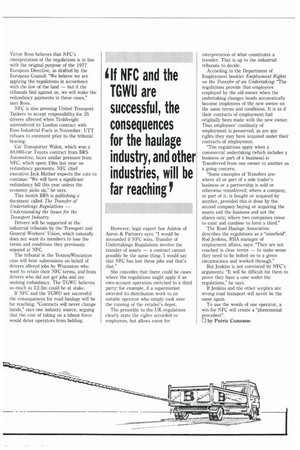If NFC and the TGWU are successful, the consequences for the haulage industry, and other industries, will be
Page 39

If you've noticed an error in this article please click here to report it so we can fix it.
far reaching I
Victor Ross believes that NFC's interpretation of the regulations is in line with the original purpose of the 1977 European Directive, as drafted by the European Council: "We believe we are applying the regulations in accordance with the law of the land — but if the tribunals find against us, we will make the redundancy payments in these cases," says Ross.
NFC is also pressing United Transport Tankers to accept responsibility for 35 drivers affected when Tankfreight surrendered its London contract with Esso Industrial Fuels in November, UTT refuses to comment prior to the tribunal hearing.
Car Transporter Walon, which won a 40,000-car Toyota contract from BRS Automotive, faces similar pressure from NFC, which spent E9m last year on redundancy payments. NFC chief executive Jack Mather expects the cuts to continue: "We will have a significant redundancy bill this year unless the economy picks up," he says.
This month BRS is publishing a document called The Transfer of Undertakings Regulations — Understanding the Issues for the Transport Industry.
Drivers will be supported at the industrial tribunals by the Transport and General Workers' Union, which naturally does not want its members to lose the terms and conditions they previously enjoyed at NFC.
The tribunal in the Texaco/Wincanton case will hear submissions on behalf of drivers offered jobs by Wincanton who want to retain their NFC terms, and from drivers who did not get jobs and are seeking redundancy. The TGWU believes as much as £2,5m could be at stake.
If NFC and the TGWU are successful the consequences for road haulage will be far reaching. "Contracts will never change hands," says one industry source, arguing that the cost of taking on a labour force would deter operators from bidding. However, legal expert Sue Ashton of Aaron & Partners says: 'I would be astounded if NFC wins. Transfer of Undertakings Regulations involve the transfer of assets — a contract cannot possibly be the same thing. I would say that NFC has lost these jobs and that's that."
She concedes that there could be cases where the regulations might apply if an own-account operation switched to a third party: for example, if a supermarket awarded its distribution work to an outside operator who simply took over the running of the retailer's depot.
The preamble to the UK regulations clearly state the rights accorded to employees, but allows room for interpretation of what constitutes a transfer. That is up to the industrial tribunals to decide.
According to the Department of Employment booklet Employment Rights on the Transfer of an Undertaking: The regulations provide that employees employed by the old owner when the undertaking changes hands automatically become employees of the new owner on the same terms and conditions, It is as if their contracts of employment had originally been made with the new owner. Thus employees' continuity of employment is preserved, as are any rights they may have acquired under their contracts of employment.
"The regulations apply when a commercial undertaking (which includes a business or part of a business) is Transferred from one owner to another as a going concern.
"Some examples of Transfers are: where all or part of a sole trader's business or a partnership is sold or otherwise transferred; where a company, or part of it, is bought or acquired by another, provided this is done by the second company buying or acquiring the assets and the business and not the shares only; where two companies cease to exist and combine to form a third."
The Road Haulage Association describes the regulations as a "minefield". Rod Jenkins, RHA manager of employment affairs, says: "They are not couched in clear terms — to make sense they need to be bolted on to a given circumstance and worked through."
But Jenkins is not convinced by NFC's arguments: "It will be difficult for them to prove they have a case under the regulations," he says.
If Jenkins and the other sceptics are wrong road transport will never be the same again.
To use the words of one operator, a win for NFC will create a "phenomenal precedent".
El by Patric Cunnane




















































































